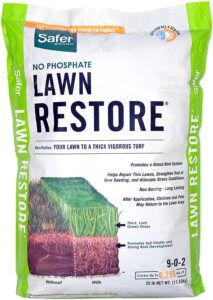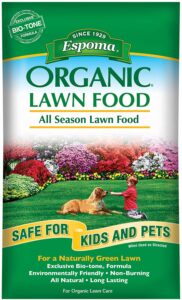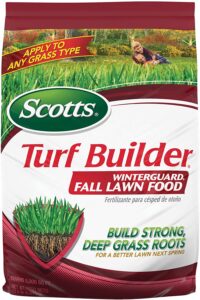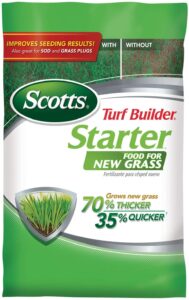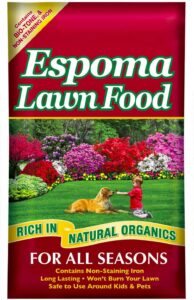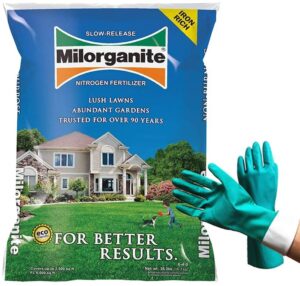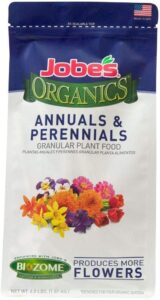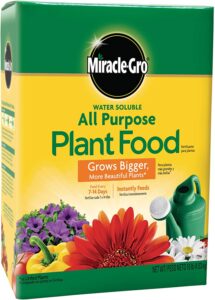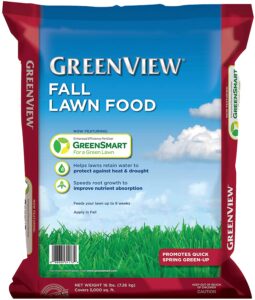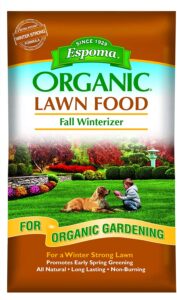
These products are made of all-natural ingredients and don’t contain any harmful chemicals but they still deliver amazing results.
There are a lot of great organic fertilizers out there. To choose the right one, it helps to understand how they work and what kind of results you can expect. Let’s take a closer look.
Organic fertilizer has a lot of benefits for both you and your lawn.
The main benefit of using organic soil is it adds organic matter to the soil and naturally increases nutrient exchange. There are billions of microorganisms in the soil that are a key part of the process and they love to eat organic fertilizer.
When the soil is healthy, it’s able to maintain better moisture levels and attracts a bigger earthworm population. Earthworms are the easiest and most effective way to naturally improve aeration and drainage plus their waste is full of nutrients that plants love.
One of the best reasons to use organic fertilizer is because it lasts a long time. Since organic material takes longer to break down, these fertilizers last for months and remain in the soil even with watering or heavy rain.
10 Best Organic Lawn Fertilizer Reviews
Safer Brand 9334 Lawn Restore Fertilizer Key Features
- Revitalizes lawn to a thick turf by strengthening root systems
- Lawns will green up within 3 to 5 days
- Promotes a robust root system for a healthier lawn and is one of the best organic lawn fertilizer
- Provides effective year-round care by helping plants withstand heat, cold and drought stresses
- Covers up to 6,250 sq ft
2. Espoma EOFW30 Organic Fall Fertilizer – 30 Pound
Espoma EOFW30 Organic Fall Fertilizer Key Features
- Made from feather meal poultry manure and sulfate of potash
- Extra potash for next year's spring greening and is one of the best organic lawn fertilizer
- 8-0-6 formulation30 lbs
- Feeds up to 5,000 sq ft
- Environmentally friendly
3. Espoma EOLF28 Organic All Season Lawn Food – 28 Pounds
Espoma EOLF28 Organic All Season Lawn Food Key Features
- For a healthy lawn
- Organic formula
- Size 18 pounds
- Covers 5000 feet
- With BioTone microbes and is one of the best organic lawn fertilizer
4. Scotts Turf Builder WinterGuard Fall Lawn Food – Fall Lawn Fertilizer
Scotts Turf Builder Winterguard Fall Lawn Food Key Features
- Builds strong, deep roots for a better lawn next spring
- Fall is the best time to fertilize to ensure your lawn is ready for next year
- Delivers nutrients that help repair damage from heat, drought and activity while preparing roots to take on harsh winter conditions
- Improves lawn's ability to absorb water and nutrients versus an unfed lawn and is one of the best organic lawn fertilizer
- Covers 5,000 sq. ft. and can be applied to any grass type
5. Scotts Turf Builder Starter Food for New Grass – Lawn Fertilizer
Scotts Turf Builder Starter Food for New Grass Key Features
- Grows new grass 70% thicker, 35% quicker versus unfed grass
- Improves seeding results; also great for sod and grass plugs
- 24-25-4 fertilizer ratio provides the nutrients for developing lawns and is one of the best organic lawn fertilizer
- Safe for any grass type, whether you're planting new grass, starting a new lawn, or reseeding an existing one
- Not sold in the state of Florida
6. Espoma ELF20 20-Pound Organic All Season Lawn Food – Lawn Fertilizer
Espoma ELF20 20-Pound Organic All Season Lawn Food Key Features
- All season lawn food
- Two to four times the coverage of natural lawn foods
- Rapid greening plus long term feeding and is one of the best organic lawn fertilizer
- Safe to use
- 18-0-3 formula
7. Milorganite 0636 Organic Nitrogen Fertilizer – Granular Nitrogen Fertilizer
Milorganite 0636 Organic Nitrogen Fertilizer Key Features
- If you look for fertilizer for promoting the growth of lush, thick, and highly green grass, Milorganite 0636 organic nitrogen fertilizer is the right choice for you. The secret of this product is 4% iron it contains, which is added for a deeper green color of your grass and is one of the best organic lawn fertilizer
- Its NPK is 5-2-0, which means that this Organic Nitrogen Fertilizer doesn’t contain potassium. Therefore, avoid using it in the regions with regular droughts. Also, since this product doesn’t contain elements for growing a robust root system, you can use it only when your grass is already well-established.
- This fertilizer meets all EPA’s quality standards and comes in plastic bags of 32 pounds. Don’t be upset with its intense smell. It will die down after watering. Always keep in mind that it is an excellent organic fertilizer, entirely safe for your children and pets.
- As a bonus, when you sprinkle this granular mix throughout your garden, you will get a repellent as well. It seems that bugs, bunnies, and deer don’t like that scent too.
- Bundled with Persons Protective Gloves. Protect your hands when you contact the fertilizers.
Jobe's Organics 09627 Organic Fertilizer Key Features
- Fertilizer Analysis: 3-5-4. Guaranteed results. No synthetic chemicals.
- Will not burn plants when applied as directed. People and pet friendly.
- Contains jobe’s proprietary microbe package, Biome with archaea which rapidly breaks down nutrients in the soil for faster results and improves soil -condition over time.
- Convenient, resealable, water-proof 4lb bag.
- All natural, safe for the environment. All natural, safe for the environment and is one of the best organic lawn fertilizer
- Apply every 4-8 weeks. Mix directly into the soil or use to side-dress.
Miracle-Gro Water Soluble All Purpose Plant Food Key Features
- Full of essential nutrients, it instantly feeds to grow bigger, more beautiful plants versus unfed plants
- Feed every 1 to 2 weeks
- Use with the Miracle Gro garden feeder or any watering can and is one of the best organic lawn fertilizer
- For all flowers, vegetables, trees, shrubs and houseplants
- Safe for all plants, guaranteed not to burn when used as directed
10. GreenView Fall Lawn Food – 16 lb
Greenview Fall Lawn Food Key Features
- No-phosphate enhanced efficiency fertilizer that promotes quick spring green-up
- Apply in fall while grass is actively growing
- Helps speed root growth to improve nutrient absorption
- Helps lawn retain water to protect against heat and drought and is one of the best organic lawn fertilizer
- Feeds your lawn up to 8 weeks
- Covers 5,000 sq ft
- GreenView Yard Wide Guarantee - Your Satisfaction Guaranteed Or Your Money Back
Types of organic lawn fertilizer
There are three different types of best organic lawn fertilizer. Each has a different makeup and adds different nutrients and minerals to the soil. The three types are:
Plant-based: Plant-based fertilizers don’t last as long as other organic options but they’re generally the best way to condition the soil. One of the major benefits of a plant-based fertilizer is they can be very effective at helping dry soils hold onto water.
Plant-based fertilizers often use bases of alfalfa meal, compost, cottonseed meal, legumes, and molasses.
Animal-based: These fertilizers include things like bone meal, blood meal, and manure. They add a lot of nitrogen to the soil and are great for the beginning of planting season or when you first seed your lawn.
Mineral based: An example of organic mineral-based fertilizer is calcium or Epsom salts which can add necessary nutrients to the soil while also changing the pH.
Sometimes, this is necessary for optimal growth and a mineral-based organic fertilizer is a great way to achieve it.
Organic Vs Chemical Fertilizer - Which works better?
Both organic and chemical lawn fertilizers give you results but they’re by no means equal.
Here are some of the differences to keep in mind while when determining what’s best for your lawn.
Application: The most common form of organic fertilizer is pellets. Application is generally pretty easy but can take a while. One big plus is that applying too much organic fertilizer does not harm your plants.
Chemical fertilizer most commonly comes in liquid form. It’s easy to apply but you have to be very careful not to use too much because it can quickly burn your lawn and cause brown spots.
Nutrients: Organic products have all the nutrients your lawn needs but the amount of each can fluctuate. That said, they do contain a lot of the macronutrients that your soil also needs.
While chemical fertilizers have precise amounts of essential nutrients, macronutrients are lacking. There’s also a danger that nutrients can build up in the soil over time and run-off when watering or during heavy rain.
Nutrient Release: Nutrients are released slowly with an organic fertilizer at a rate that plants can absorb effectively. Because of this, it requires fewer applications and won’t lead to overgrowth.
Synthetic fertilizers provide a quick burst of nutrients and generally offer a short term solution.
Grass grows quickly and needs to be mowed more frequently. Since the nutrients are released quickly, more frequent applications are needed.
Soil: There’s no question that organic fertilizer is better for soil. It gives the natural microorganisms and bacteria the food they need to help create a well-balanced ecosystem ideal for plant growth.
Chemical fertilizers don’t do anything beneficial for the soil. In fact, the can actually decrease fertility in the long run.
Conclusion
Using organic grass fertilizer is a great choice for the long-term health of your lawn. It provides a large amount of organic matter to the soil that worm and microbe populations thrive on. It leads to the slow release of nutrients over a long period of time, and good texture, drainage, and aeration of the soil.
And because of the time the nutrients are released over, you don’t have to worry so much about overdoing it when you apply it. So you won’t damage your lawn.
Our favourite choice of the best organic lawn fertilizer is Espoma EOFW30 Organic Fall Fertilizer. It comes in easy to use granules, using a source of extended release nitrogen, and with no unpleasant odour due to not using animal parts or manures.


